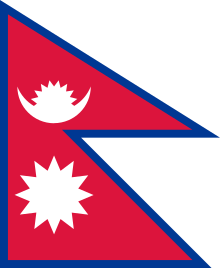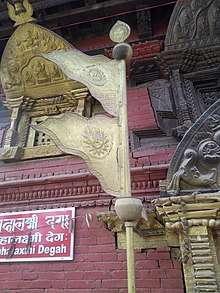Flag of Nepal
The national flag of Nepal (Nepali: नेपालको झण्डा) is the world's only non-quadrilateral flag that acts as both the state flag and civil flag of a sovereign nation.[2] The flag is a simplified combination of two single pennons (or pennants), known as a double-pennon. Its crimson red is the symbol of bravery and it also represents the color of the rhododendron, Nepal's national flower, while the blue border is the color of peace. Until 1962, the flag's emblems, the sun and the crescent moon, had human faces, but they were removed to modernize the flag.
 | |
| Name | Triangle Flag, Chandra Ra Surya, Jungi Nishan |
|---|---|
| Use | National flag |
| Proportion | see below |
| Adopted | 16 December 1962 (current version, as established in the Nepalese Constitution) |
| Design | The national flag of Nepal consists of two juxtaposed triangular figures with a crimson-coloured base and deep blue borders, there being a white emblem of the crescent moon with eight rays visible out of sixteen in the upper part and a white emblem of a twelve rayed sun in the lower part[1] |
The current flag was adopted on 16 December 1962, along with the formation of a new constitutional government.[3] It borrows from the original, traditional design,[4] used throughout the 19th and 20th centuries, and is a combination of the two individual pennons used by rival branches of the ruling dynasty.[2]
Symbolism
After Prithvi Narayan Shah unified all small principalities of Nepal, the double-pennon flag was adopted. In modern times, the flag's symbolism has evolved to incorporate several meanings. The crimson red indicates the bravery of Nepali people and is the country's national color and the blue border represents peace and harmony. The colors are often found in Nepalese decoration and works of art.[3] A theory is that the two points represented peace and hard work, using the symbols of the moon and sun respectively. Traditionally flag of Nepal is derived from Hinduism which is common in Hindu cultures. However, the modern and government-sanctioned representation is of Hinduism and Buddhism, the main religions of the country.[5][6]
The inclusion of the celestial bodies indicates Nepal's permanence and the hope that Nepal will enjoy the same longevity as the Sun and the Moon. The moon also symbolizes the cool weather of the Himalayas, whereas the sun symbolizes the heat and the high temperature of the southern lowlands (Terai).[5] Additionally, the stylized moon represents the calm demeanor and purity of spirit of the Nepali people, while the stylized sun represents their fierce resolve.[7]
During ancient times, the flags of almost all states in South Asia were triangular. Nepal has simply maintained its ancient tradition, while every other state has adopted a rectangular or square version in the European vexillological tradition.[7]

Flag layout
A precise geometrical description of the Nepalese national flag was specified in Article 5, Schedule 1 of the former constitution of the Kingdom of Nepal, adopted on 9 November 1990.[8] Schedule 1 of the Constitution of Nepal, adopted on 20 September 2015, details a specific method of making the national flag of Nepal.[9]
Aspect ratio
When constructed according to the stated geometric construction law, the ratio of the height of the flag to the longest width is an irrational number:
This ratio is the least root of the quartic polynomial[11]
and arises from the addition of the blue border after construction of the red field. The bounding rectangle of the red field alone has the rational aspect ratio 3:4 (=1:1.333...).[8]
Other flags
Incorrect versions
.svg.png)
Because of the Nepalese flag's unique proportions, its large-scale reproduction is difficult. It is sometimes overlaid on a white area to make the flag a 3:2 ratio; an example is the Nepalese flag used at some venues of the 2016 Summer Olympics.[12] The flag of Ohio, another non-quadrilateral civil flag, has also been turned into a rectangle on occasion.[13]
During a 2018 visit of the Prime Minister of India to Janakpur, a version of the flag with incorrect shape and geometrical proportions was flown by officials, causing outrage on social media and with national personnel.[14][15]
References
- "Part-1(8) National Flag – Constitution of Nepal, 2015". Nepal Law Commission. Retrieved 22 May 2020.
- "Flag of Federal Democratic Republic of Nepal (CRW Flags)". Retrieved 31 December 2018.
- "Flag of Nepal". Encyclopedia Britannica. Retrieved 24 July 2018.
- Article I, Section 5 of the Constitution of Nepal (2018)
- "The World Factbook — Central Intelligence Agency". www.cia.gov. Archived from the original on 1 July 2017. Retrieved 24 July 2018.
- "What's with the funny shape of Nepal's flag?". Public Radio International. Retrieved 24 July 2018.
- "Nepal Flag : Interesting Fact about the Flag of Nepal". www.ourtechroom.com. Retrieved 8 September 2019.
- "Nepal - Constitution - Schedules: Schedule 1 (Relating to Article 5)". International Constitutional Law, University of Bern. 9 November 1990.
- "Schedule-1 National Flag of Nepal – Nepal Law Commission". Nepal Law Commission. Retrieved 22 May 2020.
- "Calculation of the aspect ratio of the national flag of Nepal (Berechnung des Seitenverhältnisses der Nationalfahne von Nepal)". 8 June 2012. Retrieved 11 August 2016.
- Sloane, N. J. A. (ed.). "Sequence A230582 (Decimal expansion of the ratio of height to width of the bounding rectangle of the national flag of Nepal, as defined in Schedule 1 of Article 5 of its Constitution.)". The On-Line Encyclopedia of Integer Sequences. OEIS Foundation.
- "Closing Ceremony, 2016, Olympic Ceremonies - BBC Sport". BBC. Retrieved 21 December 2017.
- Purcell, John M. (23 July 2001). The Centennial of Ohio's Flag: From Obscurity to Esteem (PDF). International Congress of Vexillology. York: International Federation of Vexillological Associations. pp. 181–184.
- "Ministry seeks explanation on disfigured national flag". Retrieved 24 July 2018.
- "Province 2 sets up wrong flag of Nepal during Indian PM Modi's visit - News, sport and opinion from the Kathmandu Tribune's global edition". News, sport and opinion from the Kathmandu Tribune's global edition. 12 May 2018. Retrieved 24 July 2018.
External links
| Wikimedia Commons has media related to Flags of Nepal. |
.svg.png)


